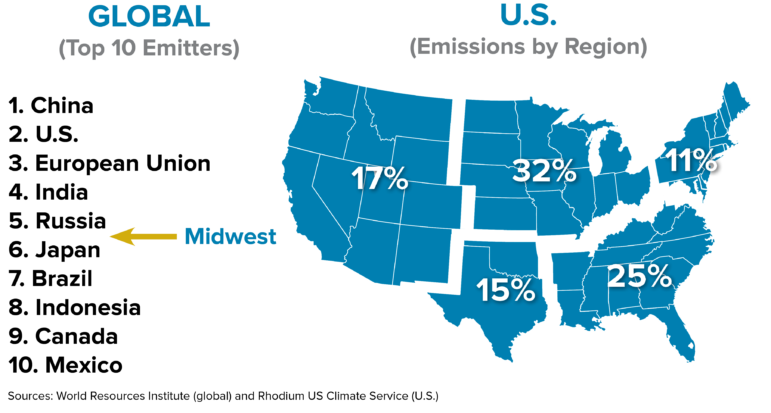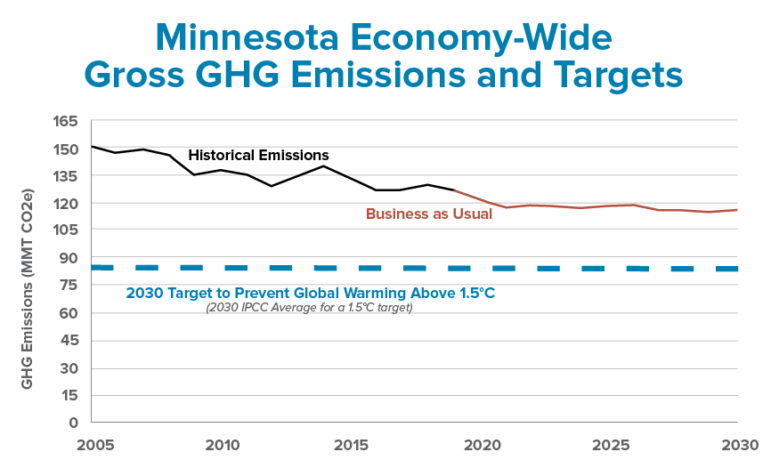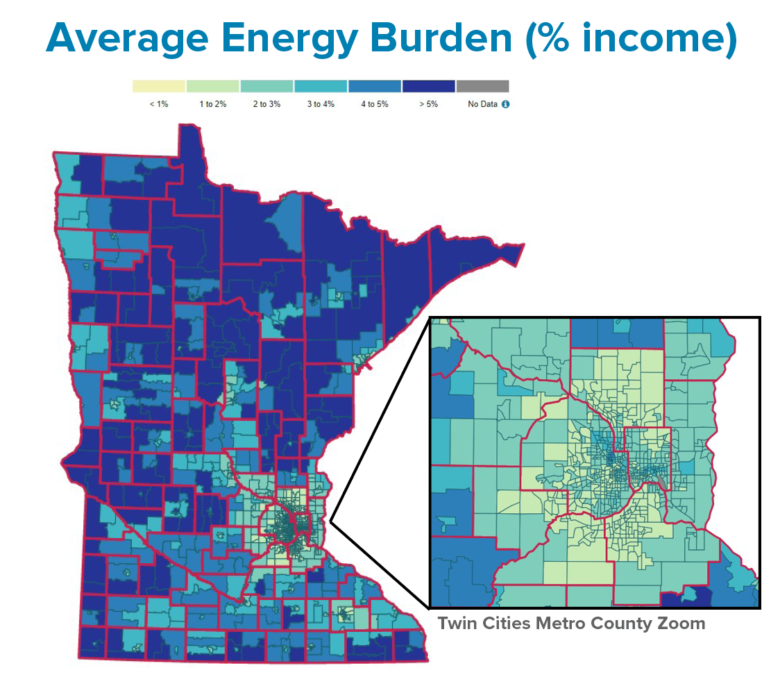The science is clear—and the extreme impacts we are already experiencing only makes it more clear and more urgent: the earth’s climate is changing, causing massive disruption and costly disasters that disproportionately harm those least able to afford it.
As thirty-year experts in energy and climate, Fresh Energy understands that there are solutions within reach that can help us prevent the very worst damages of climate change. But there is not a moment to waste, and there is no time for tepid incremental progress.
As a Midwest organization, we’re keenly aware that our region is a significant contributor of greenhouse gas emissions – even at a global scale.

We must reach a future that is carbon neutral, where any carbon pollution we emit is balanced by carbon taken out of the atmosphere. It won’t be easy, and we need to make up for lost time. And what’s more, the massive transition required to cut carbon emissions to net zero must be equitable, reducing disparities and building prosperity as we move toward a clean, healthy economy.
With these facts in mind, Fresh Energy has updated the Strategic Framework that guides our work. Using data, science, and expert knowledge of what is possible and needed we have a new mission to “Shape and drive bold policy solutions to achieve equitable carbon-neutral economies”
The vision we are working toward is a just, prosperous, and resilient future powered by a shared commitment to a carbon-neutral economy. To get there we need to build on, speed up, and expand the work we are doing to equitably cut the carbon from our electricity system and then decarbonize the rest of the economy, rapidly deploying efficiency and electrification solutions that save money in sectors like buildings and transportation.
Though Minnesota has ambitious goals, we aren’t meeting them or getting our emissions where they need to be to prevent the worst impacts of climate change.

Because progress will require public and political will, as well as technology, Fresh Energy is also doubling down on reaching and inspiring people. We need to build a big tent where people across the region and across the political landscape are mobilized toward a common vision that reduces the energy burden currently faced by Minnesotans as we decarbonize energy.

“Fresh Energy’s board and staff recognize that while we have accomplished much, we are not cutting carbon emissions fast enough,” said Fresh Energy’s newly-elected Board Chair Raj Rajan. “With Minnesota driving progress in the Midwest, and the Midwest playing a crucial role both nationally and globally, we can and must embark on a more ambitious, just, and comprehensive plan to change the trajectory on climate.”
Fresh Energy will achieve our ambitious mission through five strategic imperatives led by teams of staff experts:
1. Decarbonize the electricity sector serving Minnesota:
Speed the transition to a zero-carbon electric grid, optimizing generation, transmission, distribution through deployment and innovation. On our path to zero emission electric grid, we must attain a benchmark of 90% carbon-free electricity serving Minnesota as quickly as feasible, securing binding timetables by utilities and other key decision-makers by 2025. Concurrently, we must drive progress toward the more difficult final 10%. (Allen Gleckner, lead director, clean electricity)
2. Create a carbon-neutral economy through high-impact integrated solutions:
Partner to achieve a carbon-neutral economy by 2050 through multiple strategies and technologies, including but not limited to: energy efficiency, beneficial electrification, carbon management, product and process engineering, and changes to our built environment. Toward this end, actively identify and execute on the highest leverage opportunities across the economy including industry, transportation, agriculture, buildings, and other sectors. (Margaret Cherne-Hendrick, lead director, Energy Transition)
3. Ensure an equitable and just energy transition:
Build prosperity and health, reduce disparities, and protect consumers as we transition to carbon-neutral economies. In both process and outcome, actively engage all communities including Black, Indigenous, people of color, all genders, rural, LGBTQ+, persons with disabilities, displaced workers and others economically impacted by the transition to clean energy. (Ben Passer, lead director, Energy Access and Equity)
4. Build a shared commitment to climate action:
Create strong, collaborative partnerships with decision makers and stakeholders at all levels of government, consumers, elected officials across the political spectrum, labor unions, nonprofits in all sectors, businesses large and small, and communities most vulnerable to climate change. (Justin Fay, lead director, Public Affairs)
5. Strengthen public resolve for change:
Catalyze support for a carbon-neutral economy—from education to action. Move the public from agreement to commitment to mobilization, using a wide range of effective strategic communications, including journalism, media, issue campaigns, public speaking, and events. (Sarah Clark, Deputy Executive Director)
What thought leaders are saying:
“Fresh Energy has always been a policy catalyst to accelerate industries that can decarbonize the economy at the pace that’s needed, and this plan positions these great folks to continue to lead.”
Jigar Shah, Co-Founder and President, Generate Capital
“With its new strategic framework, Fresh Energy is elevating ambition and equity, making it clear that incremental progress is not enough and justice must be at the center of the energy transition. It is a pivotal moment for work on energy and climate, and as usual Fresh Energy is on the vanguard of progress.”
Aimee Witteman, Director, States Policy Initiative, the Climate Imperative at Energy Innovation: Policy and Technology LLC
“As an independent energy policy organization, Fresh Energy works in the public interest to advance clean energy in Minnesota and beyond. Fresh Energy’s new strategic framework emphasizes that an equitable transition and ambitious decarbonization go hand-in-hand. The framework meets a critical moment when historic disparities throughout society, including in parts of the energy system, require challenging.”
Professor Gabe Chan, PhD, Assistant Professor, University of Minnesota
Fresh Energy will be sharing more information on each of our imperatives and you will see more details on our staff leaders in the coming months.
Together, we can make change at the scale of the climate challenge.
Thank you to the committed board-staff team that crafted the strategic framework based on extensive input and research:
Board
Merritt Clapp-Smith
Anita S. Duckor
Nick Garbis
Susan Hammel
Chuck Nadler
Staff
Anjali Bains
Sarah Clark
Mat Krisetya
Michael Noble
Ben Passer
Support
Jillian Theuer
Royce Holladay
